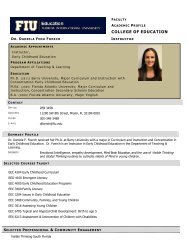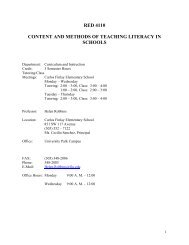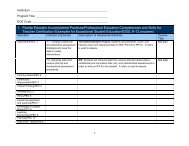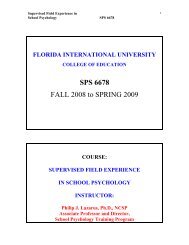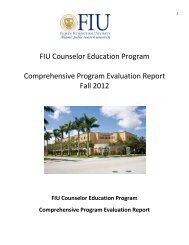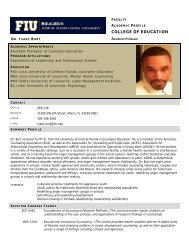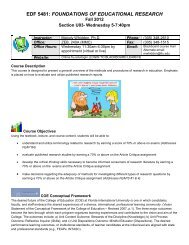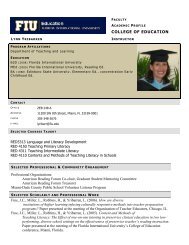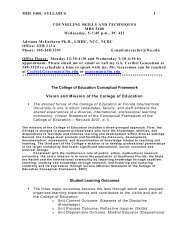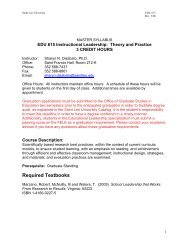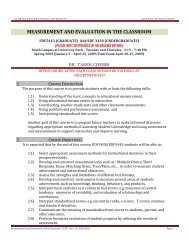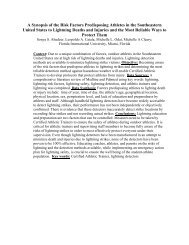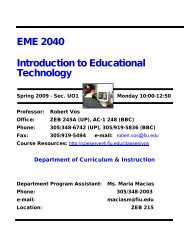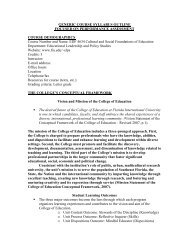Supervised Field Experience in School Psychology - College of ...
Supervised Field Experience in School Psychology - College of ...
Supervised Field Experience in School Psychology - College of ...
Create successful ePaper yourself
Turn your PDF publications into a flip-book with our unique Google optimized e-Paper software.
SPS 6678: <strong>Supervised</strong> <strong>Field</strong> <strong>Experience</strong> <strong>in</strong> <strong>School</strong> <strong>Psychology</strong> 1<br />
FLORIDA INTERNATIONAL UNIVERSITY<br />
COLLEGE OF EDUCATION<br />
SPS 6678<br />
<strong>Supervised</strong> <strong>Field</strong> <strong>Experience</strong> <strong>in</strong> <strong>School</strong> <strong>Psychology</strong><br />
Fall 2012 - Spr<strong>in</strong>g 2013<br />
Instructor : Philip J. Lazarus, Ph.D.<br />
E-mail: Philaz1@aol.com<br />
Phone numbers : 954-830-7271 or 305-348-2725<br />
Course description:<br />
<strong>Supervised</strong> <strong>Field</strong> <strong>Experience</strong> <strong>in</strong> <strong>School</strong> <strong>Psychology</strong> (10 credits). Demonstration <strong>of</strong> the<br />
full range <strong>of</strong> competencies learned throughout the program <strong>in</strong> <strong>School</strong> <strong>Psychology</strong>.<br />
Internship placements <strong>in</strong>clude a variety <strong>of</strong> field sett<strong>in</strong>gs. Prerequisite: Completion <strong>of</strong> the<br />
majority <strong>of</strong> courses <strong>in</strong> the <strong>School</strong> <strong>Psychology</strong> Program. Permission <strong>of</strong> <strong>in</strong>structor.<br />
It is recommended that students register for 5 credits each semester.
SPS 6678: <strong>Supervised</strong> <strong>Field</strong> <strong>Experience</strong> <strong>in</strong> <strong>School</strong> <strong>Psychology</strong> 2<br />
COMPETENCIES<br />
Date <strong>of</strong> Evaluation:<br />
Intern Evaluation<br />
(Circle): 1- 2 – 3- F<strong>in</strong>al<br />
Supervisor:<br />
Intern:<br />
Direction: The rat<strong>in</strong>gs <strong>of</strong> the Intern should be based upon the actual observation and/or reports from school personnel and families. In<br />
the space provided, write the number <strong>of</strong> the scale that best describes the <strong>in</strong>tern’s competence <strong>in</strong> relation to a beg<strong>in</strong>n<strong>in</strong>g, first year,<br />
school psychologist. A description <strong>of</strong> the scale po<strong>in</strong>ts is provided below.<br />
1 - Competence is considered to be <strong>in</strong> need <strong>of</strong> further tra<strong>in</strong><strong>in</strong>g. Constant supervision is required.<br />
2 - Competence is emerg<strong>in</strong>g. Close supervision is required.<br />
3 - Competence is at an average level for function<strong>in</strong>g with moderate supervision.<br />
4 - Competence is assessed to be above average suggest<strong>in</strong>g only a m<strong>in</strong>imal need for supervision.<br />
5 - Competence is very well developed and reflects a capacity for <strong>in</strong>dependent function<strong>in</strong>g with little or no supervision.<br />
NO – No Opportunity<br />
Competencies<br />
1. Pr<strong>of</strong>essionalism (Overall)<br />
♦ Follows Ethical Guidel<strong>in</strong>es<br />
♦ Follows Legal Guidel<strong>in</strong>es<br />
♦ Follows County and State Procedures<br />
♦ Ma<strong>in</strong>ta<strong>in</strong>s Pr<strong>of</strong>essional Appearance/ Attitude/ Responsibility<br />
♦ Is Prompt and Dependable<br />
Comments:<br />
2. Rapport (Overall)<br />
♦ Establishes Rapport With Clients (Children/Adolescents)<br />
♦ Establishes Rapport with <strong>School</strong> Personnel<br />
♦ Establishes Rapport with Parents<br />
Comments:<br />
3. Multiculturalism<br />
♦ Respects Individuals from Different Cultures and Backgrounds<br />
♦ Understands Individuals who have Different World Views<br />
♦ Possesses Knowledge about Research regard<strong>in</strong>g Multicultural Issues<br />
♦ Follows Guidel<strong>in</strong>es regard<strong>in</strong>g Work<strong>in</strong>g with Culturally and L<strong>in</strong>guistically Diverse<br />
Individuals<br />
♦ Is Proactive <strong>in</strong> Learn<strong>in</strong>g about Individuals from Different Cultures and<br />
Backgrounds<br />
♦ Advocates for Individuals who come from Different Cultures and Backgrounds<br />
♦ Is Sensitive to Cultural and L<strong>in</strong>guistic Diversity <strong>in</strong> Conduct<strong>in</strong>g Psychological<br />
Assessment<br />
♦ Is sensitive to Cultural and L<strong>in</strong>guistic Diversity i n Consultation and Collaboration<br />
♦ Designs Interventions that are Culturally Sensitive and Appropriate<br />
♦ Conducts Counsel<strong>in</strong>g that is Culturally Sensitive and Appropriate
SPS 6678: <strong>Supervised</strong> <strong>Field</strong> <strong>Experience</strong> <strong>in</strong> <strong>School</strong> <strong>Psychology</strong> 3<br />
Comments:<br />
4. Evaluation/ Assessment (Overall Adm<strong>in</strong>istration)<br />
♦ Demonstrates Appropriate Interview<strong>in</strong>g Skills<br />
♦ Accurately Adm<strong>in</strong>isters Intellectual/ Cognitive Instrument(s)<br />
♦ Accurately Adm<strong>in</strong>isters Academic Instrument (s)<br />
♦ Accurately Adm<strong>in</strong>isters Process Instrument(s)<br />
♦ Accurately Adm<strong>in</strong>isters Social-Emotional Instrument(s)<br />
♦ Accurately Executes a Functional Assessment <strong>of</strong> Behavior<br />
Comments:<br />
5. Report Writ<strong>in</strong>g<br />
♦ Report is Well Organized<br />
♦ Data is Integrated <strong>in</strong> Report<br />
♦ Uses Clear and Concise Language<br />
♦ Uses Appropriate Grammar and Correct Spell<strong>in</strong>g<br />
♦ Functional Information is Revealed as Necessary (Strengths and Weaknesses)<br />
♦ Significant Po<strong>in</strong>ts are Emphasized <strong>in</strong> the Body <strong>of</strong> the Report<br />
♦ Referral Questions are Clarified and Answered<br />
♦ Recommendations are Appropriate and Practical<br />
Comments:<br />
6. Staff<strong>in</strong>g Conference<br />
♦ Makes the Parent Feel Comfortable<br />
♦ Expla<strong>in</strong>s Assessment Results <strong>in</strong> an Understandable Fashion<br />
♦ Problem Solves <strong>in</strong> a W<strong>in</strong>/W<strong>in</strong> Manner Whenever Possible<br />
♦ Ma<strong>in</strong>ta<strong>in</strong>s Poise Under Pressure (e.g. Handl<strong>in</strong>g Volatile Situations)<br />
♦ Shares Difficult Information <strong>in</strong> an Empathetic Manner<br />
♦ Responds to Spontaneous Questions<br />
♦ Makes Appropriate Referrals as Necessary<br />
Comments:<br />
7. Interventions <strong>in</strong> Classroom (Overall)<br />
♦ Establishes a Collaborative Relationship<br />
♦ Identifies the Problem<br />
♦ Makes Specific Recommendations Related to Problem<br />
♦ Designs a Practical Intervention<br />
♦ Monitors Implementation <strong>of</strong> Intervention<br />
♦ Provides Follow Up<br />
♦ Evaluates and Revises Intervention as Necessary
SPS 6678: <strong>Supervised</strong> <strong>Field</strong> <strong>Experience</strong> <strong>in</strong> <strong>School</strong> <strong>Psychology</strong> 4<br />
Comments:<br />
8. Consultation<br />
Parent<br />
♦ Establishes a Consultative Relationship<br />
♦ Helps Clarify the Problem<br />
♦ Makes Appropriate and Practical Suggestions<br />
♦ Provides Appropriate Resources, Information, and Referrals as Necessary<br />
Comments:<br />
Consultation<br />
Staff<br />
♦ Establishes a Consultative Relationship<br />
♦ Helps Clarify the Problem<br />
♦ Makes Appropriate and Practical Suggestions<br />
♦ Provides Appropriate Resources, Information, and Referrals as Necessary<br />
Comments:<br />
9. Counsel<strong>in</strong>g<br />
Individual<br />
♦ Establishes Rapport<br />
♦ Helps Identify Counsel<strong>in</strong>g Goals and Objectives<br />
♦ Encourages Self-Awareness<br />
♦ Uses Effective Counsel<strong>in</strong>g Skills (e.g. empathy, active listen<strong>in</strong>g, eye contact)<br />
♦ Uses Appropriate Counsel<strong>in</strong>g Techniques, Materials, and Strategies<br />
♦ Facilitates Generalization <strong>of</strong> Positive Behaviors to Sett<strong>in</strong>gs Outside <strong>of</strong> the<br />
Counsel<strong>in</strong>g Relationship<br />
Comments:<br />
Group<br />
♦ Establishes Rapport<br />
♦ Helps Identify Counsel<strong>in</strong>g Goals and Objectives<br />
♦ Encourages Self-Awareness<br />
♦ Uses Effective Counsel<strong>in</strong>g Skills (e.g. empathy, active listen<strong>in</strong>g, eye contact)<br />
♦ Uses Appropriate Counsel<strong>in</strong>g Techniques, Materials, and Strategies<br />
♦ Facilitates Generalization <strong>of</strong> Positive Behaviors to Sett<strong>in</strong>gs Outside <strong>of</strong> the<br />
Counsel<strong>in</strong>g Relationship<br />
♦ Understands Group Dynamics<br />
♦ Manages and Ma<strong>in</strong>ta<strong>in</strong>s Focus <strong>of</strong> the Group<br />
♦ Uses Group Dynamics to Help Group Accomplish Their Goals and Objectives
SPS 6678: <strong>Supervised</strong> <strong>Field</strong> <strong>Experience</strong> <strong>in</strong> <strong>School</strong> <strong>Psychology</strong> 5<br />
Comments:<br />
10. Teach<strong>in</strong>g/Workshop Presentation (Overall)<br />
♦ Plans and Structures Workshop or Presentation<br />
♦ Provides Necessary Materials and Equipment for Workshop or Presentation<br />
♦ Conducts Workshop or Presentation Pr<strong>of</strong>essionally<br />
♦ Uses Participant and Supervisor Feedback to Evaluate Workshop<br />
Comments:<br />
11. Crisis Intervention<br />
♦ Uses understand<strong>in</strong>g <strong>of</strong> Crisis Intervention Theory and Practice<br />
♦ Follows Appropriate Policies and Procedures Regard<strong>in</strong>g Respond<strong>in</strong>g to Crisis<br />
♦ Works as a Part <strong>of</strong> a Collaborative Team Effort<br />
♦ Uses Appropriate Techniques and Strategies to Provide Support and Assistance to<br />
Other Personnel<br />
Comments:<br />
12. Supervision<br />
Seeks Supervisory Input<br />
Uses Supervisory Input<br />
Comments:<br />
Please summarize any <strong>in</strong>tern strengths or weaknesses not mentioned on the above rat<strong>in</strong>g scale. Note any<br />
tra<strong>in</strong><strong>in</strong>g experiences that should be planned for this <strong>in</strong>tern.<br />
I have read and understand this evaluation. Intern’s signature.____________________________________
SPS 6678: <strong>Supervised</strong> <strong>Field</strong> <strong>Experience</strong> <strong>in</strong> <strong>School</strong> <strong>Psychology</strong> 6<br />
Objectives Matrix<br />
Objective FEAP ESOL<br />
1.<br />
2.<br />
3.<br />
4.<br />
5.<br />
6.<br />
7.<br />
8.<br />
9.<br />
10.<br />
Florida<br />
Competencies<br />
and Skills<br />
Read<strong>in</strong>g<br />
(Replace<br />
with name <strong>of</strong><br />
program )<br />
Pr<strong>of</strong>essional<br />
Standards<br />
Assignments<br />
Include description <strong>of</strong> Taskstream assignment.<br />
Assignment 1.<br />
Course Objective(s)<br />
Accomplished Practice(s)<br />
ESOL Competency (Competencies)<br />
Read<strong>in</strong>g<br />
Pr<strong>of</strong>essional Education<br />
Competencies/Skills<br />
Subject Area Competencies/Skills<br />
Uniform Core Curriculum<br />
(Replace with name <strong>of</strong> program)<br />
Pr<strong>of</strong>essional Standards<br />
Rubric<br />
Insert assignment rubric
SPS 6678: <strong>Supervised</strong> <strong>Field</strong> <strong>Experience</strong> <strong>in</strong> <strong>School</strong> <strong>Psychology</strong> 7<br />
Case Study <strong>in</strong> Interventions/ Problem Solv<strong>in</strong>g and TaskStream Artifact<br />
TaskStream Artifacts and Rubrics Template<br />
Course SPS 6678<br />
Assignments/ 1. Case study <strong>in</strong> <strong>in</strong>terventions/ problem solv<strong>in</strong>g.<br />
Artifact<br />
Generic Name 2. <strong>School</strong>-based comprehensive psycho-educational assessment.<br />
FEAP(s)<br />
addressed<br />
For assignment 1.<br />
FEAP # 1 Assessment<br />
FEAP # 2 Communication<br />
FEAP #3 Cont<strong>in</strong>uous improvement<br />
FEAP # 4 Critical th<strong>in</strong>k<strong>in</strong>g<br />
FEAP # 5 Diversity<br />
FEAP # 7 Human development and learn<strong>in</strong>g<br />
FEAP # 8 Knowledge <strong>of</strong> subject matter<br />
FEAP # 9 Learn<strong>in</strong>g environments<br />
FEAP # 10 Plann<strong>in</strong>g<br />
FEAP # 11 Role <strong>of</strong> the teacher<br />
FEAP # 12 Technology<br />
For assignment 2.<br />
FEAP # 1 Assessment<br />
FEAP # 2 Communication<br />
FEAP # 4 Critical th<strong>in</strong>k<strong>in</strong>g<br />
FEAP # 5 Diversity<br />
FEAP # 6 Ethics<br />
FEAP # 7 Human development and learn<strong>in</strong>g<br />
FEAP #10 Plann<strong>in</strong>g<br />
FEAP # 12 Role <strong>of</strong> the teacher<br />
Brief summary<br />
<strong>of</strong> Task (max<br />
150 words)<br />
1. The student will design, implement and evaluate an <strong>in</strong>tervention that<br />
effectively responds to the educational and/or mental health needs <strong>of</strong> children<br />
and youth <strong>in</strong> the school system.
SPS 6678: <strong>Supervised</strong> <strong>Field</strong> <strong>Experience</strong> <strong>in</strong> <strong>School</strong> <strong>Psychology</strong> 8<br />
Task Description<br />
<strong>in</strong> Detail (from<br />
syllabus)<br />
Task 1. Case Study <strong>in</strong> Interventions/ Problem Solv<strong>in</strong>g<br />
Students are expected to posses the knowledge and pr<strong>of</strong>essional expertise to<br />
collaborate with families, school-based personnel, and community-based<br />
pr<strong>of</strong>essionals <strong>in</strong> design<strong>in</strong>g, implement<strong>in</strong>g, and evaluat<strong>in</strong>g <strong>in</strong>terventions that<br />
effectively respond to the educational and mental health needs <strong>of</strong> children and<br />
youth. Students should also be able to <strong>in</strong>tegrate their knowledge and skills to<br />
deliver a comprehensive range <strong>of</strong> services that result <strong>in</strong> measurable positive<br />
changes for these children and youth. To facilitate this process, students will<br />
complete a case study that will be reviewed by the University Supervisor and<br />
one additional school psychologist.<br />
Exact Contents<br />
<strong>of</strong> Artifact to be<br />
uploaded<br />
File Name SPS 6678 #1<br />
SPS 6678 #2<br />
The case study must <strong>in</strong>clude a discussion <strong>of</strong> the follow<strong>in</strong>g areas:<br />
1. Background Information, <strong>in</strong>clud<strong>in</strong>g:<br />
• Pert<strong>in</strong>ent social/emotional history<br />
• Previous <strong>in</strong>terventions<br />
2. Description and Analysis <strong>of</strong> the Problem, <strong>in</strong>clud<strong>in</strong>g:<br />
• Basel<strong>in</strong>e data<br />
• Present level <strong>of</strong> performance vs. expected level <strong>of</strong> performance<br />
• Assessment methods used<br />
• Discussion <strong>of</strong> hypothesis generated<br />
3. Goals for Intervention that:<br />
• L<strong>in</strong>k to the data and problem analysis<br />
• Are specific and realistic<br />
• Include steps for implementation<br />
• Include person(s) responsible<br />
4. Description <strong>of</strong> Outcome Data, <strong>in</strong>clud<strong>in</strong>g<br />
• Results and discussion <strong>of</strong> <strong>in</strong>tervention<br />
• Discussion <strong>of</strong> future implications<br />
5. Summary Discussion that <strong>in</strong>cludes:<br />
• Collaboration efforts with family, school, and/or communitybased<br />
<strong>in</strong>dividuals<br />
• Description <strong>of</strong> and rationale for such collaboration<br />
The case study will be reviewed and by and commented upon by the<br />
University Supervisor and one additional school psychologist.<br />
Word Document
SPS 6678: <strong>Supervised</strong> <strong>Field</strong> <strong>Experience</strong> <strong>in</strong> <strong>School</strong> <strong>Psychology</strong> 9<br />
File Type<br />
Scor<strong>in</strong>g Rubric<br />
(3 po<strong>in</strong>t Scale)<br />
Word<br />
Only target work (A grade) or satisfactory work (B grade) is acceptable <strong>in</strong><br />
this course. Work below target need to be redone.<br />
Task 1. Case study <strong>in</strong> <strong>in</strong>terventions/ problem solv<strong>in</strong>g.<br />
1. Mastery (90 -100)<br />
The student demonstrates exceptional knowledge regard<strong>in</strong>g educational or<br />
psychological <strong>in</strong>terventions. The case study <strong>in</strong>cludes background <strong>in</strong>formation,<br />
a description and analysis <strong>of</strong> the problem, goals for <strong>in</strong>tervention, description<br />
<strong>of</strong> outcome data, and a summary discussion.<br />
The background data, <strong>in</strong>clud<strong>in</strong>g pert<strong>in</strong>ent social emotional history and<br />
previous <strong>in</strong>terventions, is thoroughly described. There is a complete<br />
description and analysis <strong>of</strong> the problem which <strong>in</strong>cludes basel<strong>in</strong>e data, present<br />
level <strong>of</strong> performance versus expected level <strong>of</strong> performance, assessment<br />
methods used, and hypotheses generated. The goals for the <strong>in</strong>tervention are<br />
realistic and well specified. These l<strong>in</strong>k the data to the problem analysis. The<br />
case study also <strong>in</strong>cludes steps for implementation and cites the person(s)<br />
responsible. There is a complete description <strong>of</strong> the outcome data which<br />
<strong>in</strong>cludes the results <strong>of</strong> the <strong>in</strong>tervention and discusses any future implications.<br />
At the end <strong>of</strong> the case study, a summary discussion is provided that discusses<br />
any collaborative efforts with the family, school, and/or community along<br />
with a rationale for such collaboration. F<strong>in</strong>ally, the student describes what he<br />
or she would do differently when design<strong>in</strong>g an <strong>in</strong>tervention for a similar child<br />
or group <strong>of</strong> children.<br />
As a result <strong>of</strong> this case study, the student demonstrates that they are able to<br />
<strong>in</strong>tegrate their knowledge and skills to deliver a comprehensive range <strong>of</strong><br />
services that result <strong>in</strong> measurable positive changes for children and youth.<br />
However, it is not necessary that the <strong>in</strong>tervention was 100 % successful for<br />
the student to earn an exceptional rat<strong>in</strong>g because there are many<br />
circumstances beyond their immediate control. It is only required that the<br />
student follow best practices <strong>in</strong> design<strong>in</strong>g, implement<strong>in</strong>g and evaluat<strong>in</strong>g the<br />
<strong>in</strong>tervention.<br />
In this paper, grammar, punctuation and spell<strong>in</strong>g are near perfect. The paper<br />
has effective organization, paragraphs are concise and flow well, and<br />
sentence structure is accurate and varied.<br />
2. Pr<strong>of</strong>icient work (80 – 89)<br />
The student demonstrates pr<strong>of</strong>icient knowledge regard<strong>in</strong>g educational or<br />
psychological <strong>in</strong>terventions. The case study <strong>in</strong>cludes background <strong>in</strong>formation,
SPS 6678: <strong>Supervised</strong> <strong>Field</strong> <strong>Experience</strong> <strong>in</strong> <strong>School</strong> <strong>Psychology</strong> 10<br />
a description and analysis <strong>of</strong> the problem, goals for <strong>in</strong>tervention, description<br />
<strong>of</strong> outcome data, and a summary discussion.<br />
The background data, <strong>in</strong>clud<strong>in</strong>g pert<strong>in</strong>ent social emotional history and<br />
previous <strong>in</strong>terventions, is described though more <strong>in</strong>formation would have<br />
been helpful. There is a description and analysis <strong>of</strong> the problem which<br />
<strong>in</strong>cludes basel<strong>in</strong>e data, present level <strong>of</strong> performance versus expected level <strong>of</strong><br />
performance, assessment methods used, and hypotheses generated. The<br />
description and analysis could have been more precise. The goals for the<br />
<strong>in</strong>tervention are realistic and specified. These l<strong>in</strong>k the data to the problem<br />
analysis. The case study also <strong>in</strong>cludes steps for implementation and cites the<br />
person(s) responsible. There is a description <strong>of</strong> the outcome data which<br />
<strong>in</strong>cludes the results <strong>of</strong> the <strong>in</strong>tervention and discusses any future implications.<br />
However, the description requires more work and analysis. At the end <strong>of</strong> the<br />
case study, a summary discussion is provided that discusses any collaborative<br />
efforts with the family, school, and/or community along with a rationale for<br />
such collaboration. F<strong>in</strong>ally, the student describes what he or she would do<br />
differently when design<strong>in</strong>g an <strong>in</strong>tervention for a similar child or group <strong>of</strong><br />
children.<br />
As a result <strong>of</strong> this case study, the student demonstrates that they are able to<br />
<strong>in</strong>tegrate their knowledge and skills to deliver a comprehensive range <strong>of</strong><br />
services that result <strong>in</strong> measurable positive changes for children and youth.<br />
Nonetheless, the case study has m<strong>in</strong>or flaws and drawbacks. However, it is<br />
not necessary that the <strong>in</strong>tervention was<br />
100 % successful for the student to earn a pr<strong>of</strong>icient rat<strong>in</strong>g because there are<br />
many circumstances beyond their immediate control. It is only required that<br />
the student follow best practices <strong>in</strong> design<strong>in</strong>g, implement<strong>in</strong>g and evaluat<strong>in</strong>g<br />
the <strong>in</strong>tervention.<br />
In this paper, grammar, punctuation and spell<strong>in</strong>g are consistent with graduate<br />
level expectations. The paper has effective organization, paragraphs are<br />
concise and flow well, and sentence structure is accurate and varied.<br />
3. Limited (below 80)<br />
The student was unable to design, implement and evaluate an educational or<br />
psychological <strong>in</strong>tervention for a child or group <strong>of</strong> children accord<strong>in</strong>g to best<br />
practice standards. The student fails to demonstrate that they are able to<br />
<strong>in</strong>tegrate their knowledge and skills to deliver a comprehensive range <strong>of</strong><br />
services that result <strong>in</strong> measurable positive changes for children and youth.<br />
The task needs to be redone.
SPS 6678: <strong>Supervised</strong> <strong>Field</strong> <strong>Experience</strong> <strong>in</strong> <strong>School</strong> <strong>Psychology</strong> 11<br />
Task 2. <strong>School</strong> based comprehensive psycho-educational assessment.<br />
1. Mastery (90 -100)<br />
The report is comprehensive and thorough. Information for the report is<br />
gathered from multiple sources <strong>in</strong>clud<strong>in</strong>g the teacher, the parent(s), and other<br />
related personnel. If the child had been previously evaluated then a summary<br />
<strong>of</strong> previous results is <strong>in</strong>cluded.<br />
All test <strong>in</strong>struments are scored correctly with no mistakes. The analysis <strong>of</strong> the<br />
f<strong>in</strong>d<strong>in</strong>gs is thorough and accurate. There is great detail <strong>in</strong> discuss<strong>in</strong>g the<br />
results <strong>of</strong> the evaluation. As necessary, the student generates hypotheses<br />
about the child’s strengths and weaknesses <strong>in</strong> the areas <strong>of</strong> <strong>in</strong>tellectual<br />
function<strong>in</strong>g, process<strong>in</strong>g skills, academic achievement, personality<br />
characteristics and behavior. Cl<strong>in</strong>ical clues about the child’s test performance<br />
are presented. Any educational or psychological recommendations for the<br />
child make conceptual sense, are based on outcome data, and are relatively<br />
easy to implement.<br />
The psycho-educational report is written with effective organization,<br />
paragraphs are concise and flow well, and sentence structure is accurate and<br />
varied. Grammar, punctuation and spell<strong>in</strong>g are near perfect.<br />
In addition, to the psychological report, the student provides a one or two<br />
page discussion about the flow <strong>of</strong> the case. This may <strong>in</strong>clude <strong>in</strong>formation<br />
such as parent conferences, child study team meet<strong>in</strong>gs, <strong>in</strong>terventions<br />
attempted prior to the evaluation, behavioral observations <strong>of</strong> the child, and<br />
consultations with teachers. The student briefly discusses how they arrived at<br />
their diagnosis or conclusions. Also, the f<strong>in</strong>al results <strong>of</strong> the staff<strong>in</strong>g if<br />
completed are discussed.<br />
2. Pr<strong>of</strong>icient work (80 – 89)<br />
The report is complete. Information for the report is gathered from multiple<br />
sources <strong>in</strong>clud<strong>in</strong>g the teacher, the parent(s), and other related personnel. If the<br />
child had been previously evaluated then a summary <strong>of</strong> previous results is<br />
<strong>in</strong>cluded.<br />
All test <strong>in</strong>struments are scored correctly with few mistakes. The analysis <strong>of</strong><br />
the f<strong>in</strong>d<strong>in</strong>gs is thorough and accurate. There is detail <strong>in</strong> discuss<strong>in</strong>g the results<br />
<strong>of</strong> the evaluation; however, more specificity would have improved the report.<br />
As necessary, the student generates hypotheses about the child’s strengths<br />
and weaknesses <strong>in</strong> the areas <strong>of</strong> <strong>in</strong>tellectual function<strong>in</strong>g, process<strong>in</strong>g skills,<br />
academic achievement, personality characteristics and behavior. Most <strong>of</strong> the<br />
hypotheses generated make conceptual sense and are <strong>in</strong>tegrated <strong>in</strong>to the
SPS 6678: <strong>Supervised</strong> <strong>Field</strong> <strong>Experience</strong> <strong>in</strong> <strong>School</strong> <strong>Psychology</strong> 12<br />
report. Cl<strong>in</strong>ical clues about the child’s test performance are presented. Most<br />
<strong>of</strong> the educational or psychological recommendations for the child make<br />
conceptual sense, are based on outcome data, and are relatively easy to<br />
implement.<br />
The psycho-educational report is written with effective organization,<br />
paragraphs are concise and flow well, and sentence structure is accurate and<br />
varied. Grammar, punctuation and spell<strong>in</strong>g are near perfect.<br />
In addition, to the psychological report, the student provides a one or two<br />
page discussion about the flow <strong>of</strong> the case. This may <strong>in</strong>clude <strong>in</strong>formation<br />
such as parent conferences, child study team meet<strong>in</strong>gs, <strong>in</strong>terventions<br />
attempted prior to the evaluation, behavioral observations <strong>of</strong> the child, and<br />
consultations with teachers. The student briefly discusses how they arrived at<br />
their diagnosis or conclusions. Also, the f<strong>in</strong>al results <strong>of</strong> the staff<strong>in</strong>g if<br />
completed are discussed.<br />
3. Limited (below 80)<br />
The student was unable to write a comprehensive and through psychoeducational<br />
report accord<strong>in</strong>g to best practice standards. The student fails to<br />
demonstrate that they are able to <strong>in</strong>tegrate their knowledge and skills to write<br />
a report that will benefit the child or adolescent. The task needs to be redone.<br />
<strong>College</strong> <strong>of</strong> Education TaskStream Policies<br />
• Students must upload course artifacts two weeks before the end <strong>of</strong> classes<br />
• All students <strong>in</strong> courses with critical tasks on Taskstream must purchase accounts<br />
and upload artifacts<br />
• Students who earn an “Unacceptable” rat<strong>in</strong>g on the course critical task will be<br />
provided with one (1) remediation to achieve the Acceptable level. If students are<br />
unable to achieve Acceptable, the rat<strong>in</strong>g <strong>of</strong> “Unacceptable” will rema<strong>in</strong><br />
• Faculty must rate students’ work and provide feedback by the end <strong>of</strong> f<strong>in</strong>als week<br />
• Taskstream will be <strong>in</strong>activated by the end <strong>of</strong> the first week <strong>of</strong> the subsequent<br />
semester and students who have not uploaded as required will no longer be able to<br />
do so without written authorization from the <strong>in</strong>structor<br />
Subject Area Exam<strong>in</strong>ation <strong>in</strong> <strong>School</strong> <strong>Psychology</strong><br />
All <strong>in</strong>terns will need to take and pass the subject area exam<strong>in</strong>ation <strong>in</strong> school psychology<br />
prior to graduat<strong>in</strong>g from our program. Students need to take this exam<strong>in</strong>ation dur<strong>in</strong>g their<br />
school psychology <strong>in</strong>ternship. This requirement is considered part <strong>of</strong> the exit criteria for<br />
the school psychology <strong>in</strong>ternship. Consequently students will not receive a grade for the
SPS 6678: <strong>Supervised</strong> <strong>Field</strong> <strong>Experience</strong> <strong>in</strong> <strong>School</strong> <strong>Psychology</strong> 13<br />
second semester <strong>of</strong> <strong>in</strong>ternship until this exam is passed. Please see the Florida<br />
Department <strong>of</strong> Education web site for the times and places where this exam<strong>in</strong>ation will be<br />
adm<strong>in</strong>istered. Also send a copy <strong>of</strong> the documentation not<strong>in</strong>g that you passed the exam to<br />
your University supervisor. It is recommended that the student take the exam <strong>in</strong> January<br />
<strong>in</strong> the year <strong>in</strong> which they <strong>in</strong>tend to graduate. The rationale is that by this time the <strong>in</strong>tern<br />
will have the requisite knowledge to pass the exam. Also, if the <strong>in</strong>tern does not pass the<br />
exam the first time, they will have the opportunity to take it for a second time and if they<br />
pass it on the second attempt, this will not delay their graduation.<br />
Course Requirements that Must be Given to the Instructor<br />
The <strong>in</strong>tern must turn <strong>in</strong> two psycho-educational reports, one case study, and two<br />
supervisor evaluation forms each semester. Each <strong>in</strong>tern must also provide consultation to<br />
one or two assessment students each semester regard<strong>in</strong>g cognitive assessment. Also<br />
dur<strong>in</strong>g spr<strong>in</strong>g semester the <strong>in</strong>tern may have the opportunity to give a brief presentation <strong>of</strong><br />
a case to the SPS 6192 class.<br />
Conceptual Framework and Mission Statement<br />
The mission <strong>of</strong> our school psychology program is to prepare school psychologists to<br />
provide comprehensive school psychological services <strong>in</strong> order to promote educationally<br />
and psychologically healthy environments for all children and youths.<br />
Our mission can be best accomplished by provid<strong>in</strong>g our graduates with the knowledge,<br />
skills and disposition to be effective scientists/practitioners who can: a) respect and prize<br />
human diversity, b) create and dissem<strong>in</strong>ate new knowledge related to children and<br />
youths, c) develop school psychological services that prevent problems, enhance<br />
<strong>in</strong>dependence and promote optimal learn<strong>in</strong>g, and d) advocate for mean<strong>in</strong>gful educational,<br />
social, economic and political change through the development <strong>of</strong> pr<strong>of</strong>essional<br />
partnerships.<br />
The school psychology program is consistent with the conceptual framework and mission<br />
<strong>of</strong> the <strong>College</strong> <strong>of</strong> Education. The mission <strong>of</strong> the <strong>College</strong> is three pronged. The first is to<br />
prepare pr<strong>of</strong>essionals who have the knowledge, abilities and dispositions to facilitate and<br />
enhance learn<strong>in</strong>g and development with<strong>in</strong> diverse sett<strong>in</strong>gs. The second is to discover and<br />
dissem<strong>in</strong>ate knowledge related to learn<strong>in</strong>g, teach<strong>in</strong>g and development. The third is to<br />
develop pr<strong>of</strong>essional partnerships to promote mean<strong>in</strong>gful educational, social, economic<br />
and political change.<br />
Our program also compliments the mission <strong>of</strong> our department, which is to prepare<br />
competent, creative, knowledgeable, and skilled exceptional student educators, school<br />
and mental health counselors and school psychologists. The department’s programs are<br />
fundamentally <strong>in</strong>terdiscipl<strong>in</strong>ary <strong>in</strong> nature, share a common knowledge base and serve a<br />
multicultural multil<strong>in</strong>gual community. Department activities support the mission <strong>of</strong> the
SPS 6678: <strong>Supervised</strong> <strong>Field</strong> <strong>Experience</strong> <strong>in</strong> <strong>School</strong> <strong>Psychology</strong> 14<br />
<strong>College</strong> by prepar<strong>in</strong>g educators and allied pr<strong>of</strong>essional to aid <strong>in</strong> empower<strong>in</strong>g our clients<br />
and communities <strong>in</strong> mean<strong>in</strong>gful ways and to be proactive <strong>in</strong> advanc<strong>in</strong>g charge.<br />
The mission <strong>of</strong> the National Association <strong>of</strong> <strong>School</strong> Psychologists (NASP) also guides our<br />
program. The NASP mission is to promote educationally and psychologically healthy<br />
environments for all children and youth by implement<strong>in</strong>g research-based, effective<br />
programs that prevents problems, enhance <strong>in</strong>dependence and promote optimal learn<strong>in</strong>g.<br />
This is accomplished through state-<strong>of</strong>-the-art research and tra<strong>in</strong><strong>in</strong>g, advocacy, ongo<strong>in</strong>g<br />
program evaluation and car<strong>in</strong>g pr<strong>of</strong>essional service.<br />
Philosophical Assumptions support<strong>in</strong>g our Program<br />
Several philosophical assumptions provide the foundation upon which the program has<br />
been developed.<br />
1. The program emphasizes the ethical and moral responsibility <strong>of</strong> our<br />
pr<strong>of</strong>ession. We recognize “the obligation <strong>of</strong> pr<strong>of</strong>essional persons to provide<br />
services and to conduct themselves, so as to place the highest esteem on<br />
human rights and <strong>in</strong>dividual dignity.”<br />
2. The program is based upon the assumption that our pr<strong>of</strong>ession must serve all<br />
children. The role <strong>of</strong> the school psychologist must be expanded so that our<br />
pr<strong>of</strong>ession can be responsive to the social, emotional and educational needs <strong>of</strong><br />
all children with or without disabilities.<br />
3. We believe that social and emotional health is critical to learn<strong>in</strong>g and that we<br />
must support programs, policies and procedures designed to further social and<br />
emotional development <strong>in</strong> our nation’s children. These programs must be<br />
outcome based and supported by sound empirical research.<br />
4. The program emphasizes the <strong>in</strong>terconnectedness <strong>of</strong> schools and families. We<br />
believe school psychologists should serve as consultants to school personnel<br />
and families so that they can more effectively engage <strong>in</strong> home-school<br />
collaboration. We emphasize that school psychologists should help empower<br />
parents so that they can better assist their children <strong>in</strong> grow<strong>in</strong>g up to be<br />
responsible and productive citizens.<br />
5. We believe that our students should be prepared as practitioners/scientists who<br />
can advocate on behalf <strong>of</strong> children, adolescents and their families. We tra<strong>in</strong><br />
practitioners who help ensure that appropriate mental health and learn<strong>in</strong>g<br />
needs are supported with<strong>in</strong> the school system. We advocate for alternative<br />
delivery systems that are preventive and proactive and for the <strong>in</strong>clusion <strong>of</strong><br />
programs, policies and procedures designed to prevent psychological and<br />
learn<strong>in</strong>g problems <strong>in</strong> children and youth.<br />
6. We seek to tra<strong>in</strong> school psychologists who are prepared to function effectively<br />
<strong>in</strong> ever chang<strong>in</strong>g multicultural, multil<strong>in</strong>gual communities. Though we
SPS 6678: <strong>Supervised</strong> <strong>Field</strong> <strong>Experience</strong> <strong>in</strong> <strong>School</strong> <strong>Psychology</strong> 15<br />
celebrate diversity, we emphasize that people are more the same than they are<br />
different. People have common needs and aspirations, can relate to each other<br />
<strong>in</strong> helpful and supportive ways and are <strong>in</strong>terconnected through the community<br />
<strong>in</strong> which they live. We believe that people can be bonded through their<br />
pr<strong>of</strong>essional missions, identities, roles, and functions. The program aims to<br />
recruit and tra<strong>in</strong> pr<strong>of</strong>essionals from diverse cultural and l<strong>in</strong>guistic groups who<br />
are able to articulate a common sense <strong>of</strong> purpose <strong>in</strong> promot<strong>in</strong>g the welfare <strong>of</strong><br />
children, youth and families through the provision <strong>of</strong> comprehensive school<br />
psychological services.<br />
7. To serve children and families it is necessary that the highest level <strong>of</strong><br />
pr<strong>of</strong>essional standards be followed (see guidel<strong>in</strong>es articulated at the end <strong>of</strong><br />
this section). We seek to tra<strong>in</strong> school psychologists who possess the<br />
necessary skills, understand<strong>in</strong>gs and dispositions to provide full range school<br />
psychological services. By follow<strong>in</strong>g these standards, which mandates a<br />
mastery <strong>of</strong> skills <strong>in</strong> both education and psychology, the role <strong>of</strong> the school<br />
psychologist can be expanded.<br />
8. We see our school psychology program as cont<strong>in</strong>ually evolv<strong>in</strong>g to respond to<br />
the chang<strong>in</strong>g nature <strong>of</strong> children’s lives. We assist our students to evolve as<br />
they <strong>in</strong>culcate the values and orientation <strong>of</strong> our <strong>College</strong> so that our graduates<br />
become critical th<strong>in</strong>kers, reflective practitioners, <strong>in</strong>structional leaders,<br />
problem solvers, change agents and self directed pr<strong>of</strong>essionals. Our graduates<br />
are <strong>in</strong> a unique position as they have competencies <strong>in</strong> both psychology and<br />
education. They can provide psychological services (both direct and <strong>in</strong>direct)<br />
to address the problems that confront our nation’s children and youth<br />
(violence <strong>in</strong> the schools, teenage pregnancy, substance abuse, del<strong>in</strong>quency,<br />
child abuse, family dysfunction, divorce, learn<strong>in</strong>g difficulties, emotional<br />
problems, acute and chronic stress, isolation, poverty, suicide, etc.).<br />
THE INTERNSHIP EXPERIENCE<br />
This course is required for the Educational Specialist degree <strong>in</strong> school psychology as well<br />
as for school psychology certification by the Department <strong>of</strong> Education. The <strong>in</strong>ternship<br />
has the basic characteristics <strong>of</strong> allow<strong>in</strong>g the student to demonstrate skill pr<strong>of</strong>iciencies<br />
acquired dur<strong>in</strong>g formal tra<strong>in</strong><strong>in</strong>g on campus and to acquire additional knowledge and skills<br />
most appropriately ga<strong>in</strong>ed through field placement sett<strong>in</strong>gs.<br />
The <strong>in</strong>ternship experience is characterized <strong>in</strong> the follow<strong>in</strong>g manner:<br />
• It is generally <strong>of</strong>fered <strong>in</strong> the school sett<strong>in</strong>g and <strong>in</strong> other agencies serv<strong>in</strong>g children<br />
from <strong>in</strong>fancy to late adolescence.
SPS 6678: <strong>Supervised</strong> <strong>Field</strong> <strong>Experience</strong> <strong>in</strong> <strong>School</strong> <strong>Psychology</strong> 16<br />
• Supervision and pr<strong>in</strong>cipal responsibility for the student typically rests directly with<br />
the local <strong>of</strong>f-campus agency or school system, although <strong>in</strong>direct supervision is<br />
provided by the university.<br />
• The experience is <strong>of</strong>fered for academic credit.<br />
• The experience occurs after the successful completion <strong>of</strong> a practicum.<br />
• The experience is a requirement for certification and/or licensure.<br />
• The experience allows the <strong>in</strong>tern to be exposed to case situations, etc. that are<br />
considered representative <strong>of</strong> the role and function <strong>of</strong> the school psychologist.<br />
• The experience occurs on a full-time basis for 1200 clock hours (2 semesters).<br />
• The experience is primarily a tra<strong>in</strong><strong>in</strong>g activity and provides a balance <strong>of</strong> tra<strong>in</strong><strong>in</strong>g and<br />
service objectives and functions.<br />
• On campus coursework is reduced <strong>in</strong> proportion to the demands <strong>of</strong> the <strong>in</strong>ternship<br />
experiences<br />
The <strong>in</strong>ternship experience is seen as an <strong>in</strong>tegral part <strong>of</strong> any school psychology tra<strong>in</strong><strong>in</strong>g<br />
program. The current <strong>in</strong>ternship guidel<strong>in</strong>es published by the National Association <strong>of</strong><br />
<strong>School</strong> Psychologists are followed by our university <strong>in</strong> tra<strong>in</strong><strong>in</strong>g prospective school<br />
psychologists.<br />
The <strong>in</strong>ternship is an <strong>in</strong>tense and diversified experience and requires close supervision.<br />
Guidel<strong>in</strong>es have been developed <strong>in</strong> determ<strong>in</strong><strong>in</strong>g whether or not students are ready to<br />
beg<strong>in</strong> their <strong>in</strong>ternship. Students are advised not to take additional coursework dur<strong>in</strong>g<br />
their <strong>in</strong>ternship, though one course may be taken concurrently each semester with<br />
permission <strong>of</strong> the university <strong>in</strong>ternship coord<strong>in</strong>ator.<br />
Accord<strong>in</strong>g to NASP guidel<strong>in</strong>es, the <strong>in</strong>tern seek<strong>in</strong>g credential<strong>in</strong>g as a school psychologist<br />
must have an <strong>in</strong>ternship experience <strong>in</strong> a school sett<strong>in</strong>g. Though other sett<strong>in</strong>gs may be<br />
<strong>in</strong>corporated <strong>in</strong>to the <strong>in</strong>ternship experience, the school shall constitute at least 600 clock<br />
hours <strong>of</strong> <strong>in</strong>ternship experience. Other sett<strong>in</strong>gs must meet NASP criteria and be approved<br />
by the University coord<strong>in</strong>ator <strong>of</strong> <strong>in</strong>ternship experiences.<br />
The school has the availability <strong>of</strong>:<br />
• Children <strong>of</strong> all ages.<br />
• Pupil personnel services function<strong>in</strong>g with<strong>in</strong> a team framework.<br />
• Full-range services for handicapped children <strong>of</strong> both high and low <strong>in</strong>cidence.<br />
• Regular and special educational services at the preschool, elementary and secondary<br />
level.<br />
• At least one certified school psychologist hav<strong>in</strong>g at least two years <strong>of</strong> full-time<br />
school psychologist experience or the equivalent who serves as the <strong>in</strong>ternship<br />
supervisor. This supervisor must be on-site.<br />
It is not essential that the above all be provided with<strong>in</strong> the context <strong>of</strong> the local educational<br />
agency to which the <strong>in</strong>tern is assigned. However, it is essential that all elements be<br />
available and <strong>in</strong>corporated <strong>in</strong>to the jo<strong>in</strong>t experience.
SPS 6678: <strong>Supervised</strong> <strong>Field</strong> <strong>Experience</strong> <strong>in</strong> <strong>School</strong> <strong>Psychology</strong> 17<br />
The required school-based <strong>in</strong>ternship is provided <strong>of</strong>f campus <strong>in</strong> a local educational<br />
agency. While the authority for provid<strong>in</strong>g <strong>in</strong>ternship credit and grades rests with the<br />
university <strong>in</strong>tern and supervisors, primary responsibility for <strong>in</strong>tern supervision usually<br />
rests with appropriately credentialed local educational agency personnel.<br />
It is to be expected that local supervision is provided by a person(s) hold<strong>in</strong>g valid<br />
certification as a school psychologist, who is employed full time as a school psychologist<br />
<strong>in</strong> the local educational agency and who has held such employment <strong>in</strong> that agency for a<br />
m<strong>in</strong>imum <strong>of</strong> one school year prior to undertak<strong>in</strong>g supervisory responsibilities. For school<br />
psychologists <strong>in</strong> Florida, the school psychologist has met Cl<strong>in</strong>ical Education Tra<strong>in</strong><strong>in</strong>g<br />
requirement. In non-school sett<strong>in</strong>gs, supervisory personnel hold an appropriate credential<br />
for that sett<strong>in</strong>g.<br />
The university <strong>in</strong>ternship supervisor is responsible for provid<strong>in</strong>g appropriate orientation<br />
to non-program supervisors. This facilitates the clarification <strong>of</strong> the role and function <strong>of</strong><br />
all parties and assists the non-program supervisor <strong>in</strong> carry<strong>in</strong>g out responsibilities <strong>in</strong> a<br />
manner consistent with tra<strong>in</strong><strong>in</strong>g objectives.<br />
It is expected that both university supervisors and local supervisors demonstrate active<br />
<strong>in</strong>volvement <strong>in</strong> the pr<strong>of</strong>ession as evidenced through pr<strong>of</strong>essional competence, and<br />
cont<strong>in</strong>ued pr<strong>of</strong>essional development. The most important component, however, is a<br />
commitment to provide all necessary supervision to prepare the <strong>in</strong>tern for prospective<br />
practice.<br />
THE RELATIONSHIP BETWEEN THE UNIVERSITY,<br />
THE LOCAL EDUCATIONAL AGENCY AND<br />
THE SCHOOL PSYCHOLOGY INTERN<br />
A. Contract and salary: a written contractual agreement is prepared and agreed to by<br />
both the local educational agency and the <strong>in</strong>tern school psychologist. The contractual<br />
agreement specifies the time period and salary provided. When f<strong>in</strong>ancially possible<br />
the <strong>in</strong>tern is provided a salary commensurate with his or her level <strong>of</strong> tra<strong>in</strong><strong>in</strong>g,<br />
experience and period <strong>of</strong> appo<strong>in</strong>tment. Contractual agreements are not entered <strong>in</strong>to<br />
which require the <strong>in</strong>tern to rema<strong>in</strong> <strong>in</strong> the employment <strong>of</strong> the local educational agency<br />
beyond employment dur<strong>in</strong>g the <strong>in</strong>ternship. Moreover, such arrangements do not<br />
specify <strong>in</strong> advance that employment for the <strong>in</strong>tern is guaranteed beyond the<br />
<strong>in</strong>ternship.<br />
B. Schedule <strong>of</strong> appo<strong>in</strong>tment: The <strong>in</strong>tern is assigned to the same schedule and calendar<br />
time as are other school psychology staff employed by the local educational agency.<br />
<strong>Experience</strong>s such as <strong>in</strong>-service meet<strong>in</strong>gs, conferences, etc., participated <strong>in</strong> by local<br />
educational agency school psychologists are also expected <strong>of</strong> <strong>in</strong>terns. Like regularly<br />
employed psychological services personnel, the <strong>in</strong>tern evidences a commitment to the<br />
provision <strong>of</strong> psychological services not necessarily reflected <strong>in</strong> hourly schedules.
SPS 6678: <strong>Supervised</strong> <strong>Field</strong> <strong>Experience</strong> <strong>in</strong> <strong>School</strong> <strong>Psychology</strong> 18<br />
C. Awareness <strong>of</strong> the need for cont<strong>in</strong>ued pr<strong>of</strong>essional development: It is important that<br />
cont<strong>in</strong>ued pr<strong>of</strong>essional development be recognized as a significant aspect <strong>of</strong> the<br />
<strong>in</strong>ternship. The <strong>in</strong>tern is expected to participate <strong>in</strong> scheduled appropriate university,<br />
regional and state-wide meet<strong>in</strong>gs for school psychologists. The opportunity to<br />
participate <strong>in</strong> national level meet<strong>in</strong>gs is also encouraged. When reimbursement or<br />
other f<strong>in</strong>ancial support <strong>in</strong> unavailable, released time for attendance at pr<strong>of</strong>essional<br />
meet<strong>in</strong>gs is provided. In <strong>in</strong>stances where released time is judged to detract from the<br />
provision <strong>of</strong> the <strong>in</strong>ternship experiences as planned, an agreement may be reached <strong>in</strong><br />
which the <strong>in</strong>tern serves additional time beyond the contractual schedule or calendar.<br />
D. Travel expenses: The provision <strong>of</strong> appropriate <strong>in</strong>ternship experiences <strong>of</strong>ten requires<br />
job-related travel. When such exists, the <strong>in</strong>tern is provided reimbursement consistent<br />
with policies <strong>of</strong> the local educational agency.<br />
E. Work environment: The provision <strong>of</strong> quality psychological services requires a<br />
supportive work environment. The local educational agency ensures that the <strong>in</strong>tern is<br />
provided adequate supplies and materials to carry out the functions <strong>of</strong> the <strong>in</strong>ternship.<br />
In addition, adequate privacy <strong>of</strong> <strong>of</strong>fice facilities and access to secretarial assistance is<br />
ma<strong>in</strong>ta<strong>in</strong>ed. The physical plant has available central <strong>of</strong>fice facilities for files,<br />
pr<strong>of</strong>essional library, storage <strong>of</strong> supplies and material, and telephone services. Access<br />
to <strong>of</strong>fice equipment such as duplication devices and record<strong>in</strong>g equipment is also<br />
provided. These provisions are consistent with the availability afforded staff<br />
members.<br />
F. Provision <strong>of</strong> supervision: The local educational agency ensures that supervisory<br />
personnel meet the criteria specified. Released time for personal supervisory contact<br />
with each <strong>in</strong>tern <strong>in</strong> the amount specified above and the maximum number <strong>of</strong> <strong>in</strong>terns<br />
to be served is afforded the supervisor. In order to provide the quality <strong>of</strong> <strong>in</strong>ternship<br />
supervision required, local educational agency supervisors are granted the equivalent<br />
<strong>of</strong> one work day per week <strong>of</strong> assigned time for each <strong>in</strong>tern supervised, with full-time<br />
assignment <strong>of</strong> duties granted to the supervision <strong>of</strong> six <strong>in</strong>terns. In no <strong>in</strong>stance shall<br />
more than six <strong>in</strong>terns be assigned to one supervisor.<br />
G. Tra<strong>in</strong><strong>in</strong>g commitment: The local educational agency is committed to the <strong>in</strong>ternship as<br />
basically a tra<strong>in</strong><strong>in</strong>g experience. The appo<strong>in</strong>tment <strong>of</strong> <strong>in</strong>terns as a means <strong>of</strong> acquir<strong>in</strong>g<br />
less expensive services is <strong>in</strong>appropriate. Interns are expected to engage <strong>in</strong> tasks<br />
appropriate to the completion <strong>of</strong> the plan <strong>of</strong> <strong>in</strong>ternship. The <strong>in</strong>tern is not asked to<br />
serve <strong>in</strong> any capacity other than that for which he or she was appo<strong>in</strong>ted. Tasks<br />
requir<strong>in</strong>g teach<strong>in</strong>g assignment, playground or other supervision, etc., <strong>in</strong>digenous to<br />
the roles <strong>of</strong> other school personnel are <strong>in</strong>cluded only when there is a specific rationale<br />
related to the completion <strong>of</strong> the <strong>in</strong>ternship objectives.<br />
INTERSHIP EXPERIENCES
SPS 6678: <strong>Supervised</strong> <strong>Field</strong> <strong>Experience</strong> <strong>in</strong> <strong>School</strong> <strong>Psychology</strong> 19<br />
The experience <strong>of</strong> the school psychology <strong>in</strong>terns is to parallel that <strong>of</strong> a practic<strong>in</strong>g school<br />
psychologist. <strong>Experience</strong>s to master the <strong>in</strong>ternship competencies need to be provided by<br />
the field based supervisor. It is expected that the <strong>in</strong>tern will provide psychoeducational<br />
evaluations and diagnostic reports. The <strong>in</strong>tern needs to be <strong>in</strong>volved <strong>in</strong> child study teams<br />
and multidiscipl<strong>in</strong>ary staff<strong>in</strong>g. They are required to design effective <strong>in</strong>terventions with<br />
children and conduct <strong>in</strong>-service workshops for parents or school personnel. They are<br />
<strong>in</strong>volved <strong>in</strong> consultation with parents, teachers, and adm<strong>in</strong>istration. It is required that the<br />
<strong>in</strong>tern be a part <strong>of</strong> crisis <strong>in</strong>tervention teams and conduct child counsel<strong>in</strong>g.<br />
Interns need to have experiences with children <strong>in</strong> elementary, middle and senior high<br />
schools. Therefore, an <strong>in</strong>tern is assigned a m<strong>in</strong>imum <strong>of</strong> three different schools.<br />
Moreover, it is expected that the <strong>in</strong>tern ga<strong>in</strong> experience with children with both high and<br />
low-<strong>in</strong>cidence handicapp<strong>in</strong>g conditions. These <strong>in</strong>clude but are not limited to the<br />
<strong>in</strong>tellectually disabled, emotionally handicapped, severely emotionally disturbed, specific<br />
learn<strong>in</strong>g disabled, pervasive developmentally delayed and autistic. <strong>Experience</strong>s<br />
evaluat<strong>in</strong>g gifted children are also <strong>in</strong>cluded.<br />
Interns have a primary school psychology supervisor. However, frequently <strong>in</strong>terns may<br />
have secondary school psychology supervisors who are able to provide additional<br />
experience dur<strong>in</strong>g the two semester long <strong>in</strong>ternship (1200) clock hours. For example, a<br />
supervisor may have additional expertise with a specific population (e.g. preschool<br />
<strong>in</strong>tellectually disabled; severely emotionally disturbed adolescents) and the <strong>in</strong>tern will be<br />
assigned to work with this supervisor for a period <strong>of</strong> time (e.g., two days a week for three<br />
months). In some <strong>in</strong>stances, <strong>in</strong>terns may do a rotation near the end <strong>of</strong> their experience<br />
(e.g., four weeks <strong>in</strong> a diagnostic and <strong>in</strong>tervention program for elementary age emotionally<br />
handicapped children; two weeks work<strong>in</strong>g with cerebral palsied children). Interns <strong>in</strong><br />
conjunction with their supervisors set up additional experiences that may relate to their<br />
specific <strong>in</strong>terests. For example, with PL 99-457, there has been a greater need to provide<br />
psychological services to pre-school handicapped children and a number <strong>of</strong> our <strong>in</strong>terns<br />
have requested school psychology experience with this population.<br />
As this is a tra<strong>in</strong><strong>in</strong>g experience, no specific required number <strong>of</strong> evaluations,<br />
consultations, etc. are expected. Nonetheless, they need to produce what is reasonable<br />
and customary <strong>in</strong> terms <strong>of</strong> their experience and tra<strong>in</strong><strong>in</strong>g. As a rule <strong>of</strong> thumb, it may be<br />
expected that dur<strong>in</strong>g the first 600 hours, the <strong>in</strong>tern should be expected to provide school<br />
psychological services at approximately 50% <strong>of</strong> the rate <strong>of</strong> a practic<strong>in</strong>g school<br />
psychologist and dur<strong>in</strong>g the second 600 hours at a rate <strong>of</strong> 70%.<br />
GUIDELINES FOR INTERN SUPERVISORS<br />
Each supervisor is given leeway <strong>in</strong> regard to how they wish to supervise <strong>in</strong>terns.<br />
However, some guidel<strong>in</strong>es are suggested. Typically, <strong>in</strong>terns will first observe their
SPS 6678: <strong>Supervised</strong> <strong>Field</strong> <strong>Experience</strong> <strong>in</strong> <strong>School</strong> <strong>Psychology</strong> 20<br />
supervisor <strong>in</strong> all phases <strong>of</strong> psychological services. Then they are observed <strong>in</strong> each phase<br />
<strong>in</strong>clud<strong>in</strong>g psychoeducational evaluations, consultation, counsel<strong>in</strong>g, crisis <strong>in</strong>tervention,<br />
child study teams, multidiscipl<strong>in</strong>ary staff<strong>in</strong>g, classroom <strong>in</strong>terventions, <strong>in</strong>-service<br />
workshops, etc. F<strong>in</strong>ally, they are given <strong>in</strong>dependence with on-go<strong>in</strong>g supervision. The<br />
speed <strong>in</strong> which this is accomplished <strong>of</strong>ten depends on the <strong>in</strong>com<strong>in</strong>g experiences <strong>of</strong> the<br />
<strong>in</strong>tern. For example, if the <strong>in</strong>tern had previously worked as a special education teacher,<br />
school counselor, or social worker then they would have extra experience that would<br />
facilitate their entry <strong>in</strong>to the field experience.<br />
Intern supervisors need to evaluate the <strong>in</strong>tern every eight weeks. If any difficulty occurs,<br />
they need to immediately contact the University Coord<strong>in</strong>ator <strong>of</strong> <strong>School</strong> <strong>Psychology</strong><br />
Internships.<br />
Intern supervisors may wish to consult the chapter by Jeremy R. Sullivan and Jane Close<br />
Conoley entitled Best Practices <strong>in</strong> the Supervision <strong>of</strong> Interns <strong>in</strong> Best Practices <strong>in</strong> <strong>School</strong><br />
<strong>Psychology</strong>, 5 th ed.<br />
EVALUATION, FEEDBACK AND THE AWARDING OF GRADES<br />
The student is evaluated every eight weeks on the exit competencies. Please make sure<br />
that your supervisor has copies <strong>of</strong> the evaluation form found on pages three through six<br />
<strong>of</strong> this syllabus. An alternate form may be used if all the requisite competencies specified<br />
on our form are covered. A conference is set up between the <strong>in</strong>tern supervisor and the<br />
<strong>in</strong>tern to discuss each formal evaluation. This evaluation is shared with the university<br />
supervisor. However, <strong>in</strong>terns receive formal supervision with feedback for a m<strong>in</strong>imum <strong>of</strong><br />
two hours per week. The <strong>in</strong>ternship experience is considered to provide cont<strong>in</strong>uous<br />
feedback, where the supervisor discusses each and every case with the <strong>in</strong>tern. In fact, this<br />
is mandatory as the supervis<strong>in</strong>g school psychologist is required to sign <strong>of</strong>f on each<br />
<strong>in</strong>dividual case.<br />
The <strong>in</strong>tern also receives feedback from the university <strong>in</strong>ternship coord<strong>in</strong>ator where cases,<br />
problem, situations, and issues are discussed. The <strong>in</strong>tern, the school-based supervisor and<br />
the university supervisor sign and discuss each formal evaluation. Feedback for<br />
improvement is provided as necessary.<br />
Procedures have been designated which recognize the importance <strong>of</strong> due process,<br />
respect<strong>in</strong>g the rights and privileges <strong>of</strong> all parties <strong>in</strong>volved. The assignment <strong>of</strong> academic<br />
credit necessitates that the University Coord<strong>in</strong>ator <strong>of</strong> <strong>School</strong> <strong>Psychology</strong> Internships has<br />
the authority for the <strong>of</strong>ficial specification <strong>of</strong> the grade. Significant <strong>in</strong>put is received from<br />
school-bases school psychologists <strong>in</strong> a formal evaluation four times dur<strong>in</strong>g the <strong>in</strong>ternship.<br />
This process allows for ongo<strong>in</strong>g evaluation. Evaluation is seen as the comb<strong>in</strong>ed<br />
responsibilities <strong>of</strong> all parties <strong>in</strong>volved, <strong>in</strong>clud<strong>in</strong>g local supervisor(s), <strong>in</strong>terns, and the<br />
University Coord<strong>in</strong>ator <strong>of</strong> <strong>School</strong> <strong>Psychology</strong> Internships.
SPS 6678: <strong>Supervised</strong> <strong>Field</strong> <strong>Experience</strong> <strong>in</strong> <strong>School</strong> <strong>Psychology</strong> 21<br />
The University Coord<strong>in</strong>ator <strong>of</strong> <strong>School</strong> <strong>Psychology</strong> Internships has the responsibility <strong>of</strong><br />
assign<strong>in</strong>g grades. This is done <strong>in</strong> conjunction with the school-based school psychologist.<br />
Grades are determ<strong>in</strong>ed by the performance <strong>of</strong> the <strong>in</strong>tern on the exit competencies dur<strong>in</strong>g<br />
the course <strong>of</strong> their field experience. Evaluations are based on what is expected <strong>of</strong> an<br />
<strong>in</strong>tern and not a highly experienced school psychologist.<br />
Grades are assigned on the follow<strong>in</strong>g:<br />
A. The majority <strong>of</strong> competencies are rated to be highly competent or outstand<strong>in</strong>g with<br />
little or no further supervision required.<br />
B. The majority <strong>of</strong> competencies are rated to be above average with m<strong>in</strong>imal supervision<br />
required.<br />
C. The majority <strong>of</strong> competencies are rated to be m<strong>in</strong>imally competent to competent with<br />
moderate supervision still required<br />
D. The majority <strong>of</strong> competencies are rated to be not yet competent to m<strong>in</strong>imal<br />
competent.<br />
E. The majority <strong>of</strong> competencies are rated <strong>in</strong> the unsatisfactory to not yet competent<br />
level.<br />
Some subjectivity comes <strong>in</strong>to play when award<strong>in</strong>g grades to a field-based <strong>in</strong>ternship.<br />
Nonetheless, cont<strong>in</strong>uous feedback, open-ended evaluations between all parties and the<br />
use <strong>of</strong> secondary supervisors all may lessen this factor. Grades may also be <strong>in</strong>fluenced<br />
positively by demonstrat<strong>in</strong>g cont<strong>in</strong>uous improvement dur<strong>in</strong>g the four evaluations as well<br />
as the <strong>in</strong>tern’s ability to respond favorably to feedback and suggestions.<br />
The University has a F<strong>in</strong>al Report Form that needs to be completed at the end <strong>of</strong> the<br />
<strong>in</strong>ternship. The school-based school psychology supervisor receives credit to take<br />
University courses for provid<strong>in</strong>g supervision. It is the responsibility <strong>of</strong> the <strong>in</strong>tern to<br />
ensure that this is completed and to return this form to the TEC <strong>of</strong>fice at the University.<br />
This form will need to be completed for an <strong>in</strong>tern to receive a grade.<br />
An <strong>in</strong>tern will need to receive a grade <strong>of</strong> an A or B to be recommended by the University<br />
Coord<strong>in</strong>ator <strong>of</strong> <strong>School</strong> <strong>Psychology</strong> Internships for a position <strong>in</strong> the pr<strong>of</strong>ession.<br />
Standards <strong>of</strong> Academic Conduct: Graduate students shall observe the highest standards<br />
<strong>of</strong> academic conduct, ethics and <strong>in</strong>tegrity as stated <strong>in</strong> the Student Handbook.<br />
Florida International University is a community dedicated to generat<strong>in</strong>g and impart<strong>in</strong>g<br />
knowledge through excellent teach<strong>in</strong>g and research, the rigorous and respectful exchange<br />
<strong>of</strong> ideas and community service. All students should respect the right <strong>of</strong> others to have an<br />
equitable opportunity to learn and honestly to demonstrate the quality <strong>of</strong> their learn<strong>in</strong>g.
SPS 6678: <strong>Supervised</strong> <strong>Field</strong> <strong>Experience</strong> <strong>in</strong> <strong>School</strong> <strong>Psychology</strong> 22<br />
Therefore, all students are expected to adhere to a standard <strong>of</strong> academic conduct, which<br />
demonstrates respect for themselves, their fellow students, and the educational mission <strong>of</strong><br />
the University. All students are deemed by the University to understand that if they are<br />
found responsible for academic misconduct, they will be subject to the Academic<br />
Misconduct procedures and sanctions, as outl<strong>in</strong>ed <strong>in</strong> the Student Handbook.<br />
Misconduct <strong>in</strong>cludes: Cheat<strong>in</strong>g – The unauthorized use <strong>of</strong> books, notes, aids, electronic<br />
sources; or assistance from another person with respect to exam<strong>in</strong>ations, course<br />
assignments, field service reports, class recitations; or the unauthorized possession <strong>of</strong><br />
exam<strong>in</strong>ation papers or course materials, whether orig<strong>in</strong>ally authorized or not. Plagiarism<br />
– The use and appropriation <strong>of</strong> another’s work without any <strong>in</strong>dication <strong>of</strong> the source and<br />
the representation <strong>of</strong> such work as the student’s own. A student, who fails to give credit<br />
for ideas, expressions or materials taken from another source, <strong>in</strong>clud<strong>in</strong>g <strong>in</strong>ternet sources,<br />
is responsible for plagiarism.<br />
REQUIRED TEXTS or DOCUMENTS<br />
American Psychological Association (2010). Ethical pr<strong>in</strong>ciples <strong>of</strong> psychologists<br />
Wash<strong>in</strong>gton, DC (http://www.apa.org/ethics/code/<strong>in</strong>dex.aspx)<br />
National Association <strong>of</strong> <strong>School</strong> Psychologists (2010). Model for Comprehensive and<br />
Integrated <strong>School</strong> Psychological Services. Bethesda, MD.<br />
(http://www.nasponl<strong>in</strong>e.org/standards/2010standards/2_PracticeModel.pdf)<br />
National Association <strong>of</strong> <strong>School</strong> Psychologists (2010). Pr<strong>in</strong>ciples for pr<strong>of</strong>essional ethics.<br />
Bethesda, MD.<br />
(http://www.nasponl<strong>in</strong>e.org/standards/2010standards/1_%20Ethical%20Pr<strong>in</strong>ciples.pdf)<br />
National Association <strong>of</strong> <strong>School</strong> Psychologists (2010). Standards for the credential<strong>in</strong>g <strong>of</strong><br />
school psychologists. Bethesda, MD:<br />
(http://www.nasponl<strong>in</strong>e.org/standards/2010standards/2_Credential<strong>in</strong>g_Standards.pdf)<br />
The above listed documents can be found <strong>in</strong> the follow<strong>in</strong>g text. They can also be found at<br />
the NASP website. www.nasponl<strong>in</strong>e.org<br />
Thomas, A., & Grimes, J. (2008). Best practices <strong>in</strong> school psychology: IV. Bethesda,<br />
MD: Author.<br />
Additional read<strong>in</strong>gs such as journal articles, monographs, books, manuals, etc. will be<br />
assigned by the <strong>in</strong>structor and/or the field-based supervisor.<br />
ASSIGNMENT<br />
Read<strong>in</strong>g assignments will be given at each class session.
SPS 6678: <strong>Supervised</strong> <strong>Field</strong> <strong>Experience</strong> <strong>in</strong> <strong>School</strong> <strong>Psychology</strong> 23



